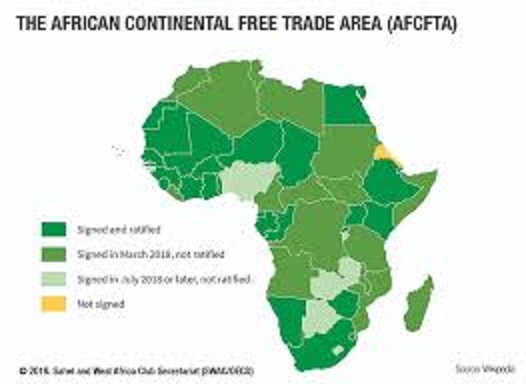Mr Wamkele Mene, Secretary-General, Africa Continental Free Trade Area (AfCFTA), has described the Pan-African Payments and Settlement Systems (PAPSS) as a game-changer, particularly for businesses run by young entrepreneurs under the AfCFTA.
Mene made the assertion at the 2nd Ceremony of Lighting the Africa Trade Torch (ATT) by the Africa Business Council (ABC), in Cairo, Egypt on Thursday.
The newly launched PAPSS is a centralised payment system aimed at facilitating easier, more voluminous intra-African trade under the AfCFTA.
Mene noted that the PAPSS was also a fulfillment of one of the aspirations of the inaugural ceremony of lighting the Africa trade of the AfCFTA.
He said that PAPSS has potential to help young entrepreneurs access new markets without facing the cost challenges of currency conversion.
He added that another milestone from the last ceremony was the provision of a fully functional dispute settlement body to address disputes under the AfCFTA.
The AfCFTA scribe said the development showed the continent’s commitment to building investors’ and business confidence in an African multilateral trade rule system under the AfCFTA.
“Also, the recently held intra-African Trade Fair (IATF) in collaboration with the African Export-Import Bank with over 12, 000 participants and over $40 billion trade deals shows Africa’s commitment to keeping trade going in the face of the COVID-19 pandemic.
“This milestone ceremony is to remind ourselves of the AfCFTA and what we have achieved together as a continent especially as private sector engagement and partnership continues to gain strength.
“Last year’s torch lighting ceremony had aspirations and the newly launched PAPSS would go a long way to address the challenges of currency conversion.
“It presents Africa the opportunity to reduce dependency on other currency as a fully functional payment system of Africa is a bedrock.
“Private sector, traders and investors have certainty and credibility of the market when they trade under the AfCFTA,” he said.
Mr Albert Muchanga, Commissioner, Trade and Industry, African Union Commission, revealed that an African standard for the trade would within the year be produced to engender competitiveness under the AfCFTA.
He said the creation of standards would encourage the easier movement of goods and services across the continent under the agreement.
Muchanga tasked member countries to develop strategic alliances and complement the government’s efforts to be well-positioned to be able to cater for the continent’s growing 1.3 billion people under the AfCFTA.
“Speed matters and a good indicator of speed is that at each stage, you are able to deliver tangible results.
“Next year’s torch lighting ceremony must be celebrated with statistics as to how much volume of trade has been achieved within the period,” he said.
Mr Niyi Adebayo, Nigerian Minister, Industry, Trade and Investment (FMITI), noted that the effects of the AfCFTA on economic and social transformation depended on the degree to which the private sector could seize the opportunities the agreement provided.
Adebayo, represented by Mr Kabir Akanbi- Director, FMITI, said this could be achieved by making African economies more competitive and enabling development and elevation of regional value chains with focus on Small and Medium Enterprises (SMEs).
He called on the Nigerian private sector to fully key into the AfCFTA and also lend their support to the work being done by the African Business Council.
“Although the private sector is the engine of the African economy, I must appeal to governments to assume the important role of promoting trade development.
“For the private sector to succeed, we need entrepreneurial states with governments that would assume regulatory, coordinating and catalytic roles.
“African governments should be the lead risk-takers in terms of investing in large-scale innovations and technology that would drive economic success,” he said.
Dr Amany Asfour, President, Africa Business Council (ABC), said the ceremony served as a symbol to promote start-ups and standardisation of goods in advancing Africa’s industrialisation agenda.
“For the sake of a prosperous, united Africa, we need to have Africa-based, Africa-managed businesses, goods and services to give value to the continent and boost African industrialisation agenda.
Mr Mansur Ahmed, Interim Chairman, Pan-African Manufacturers Association (PAMA), called for greater cooperation between manufacturers and countries to foster economic growth and boost social change.
“It is time to herald a new era; an era where African products will be on every shelf, in every supermarket and market, consumed in every household from Cairo to Cape, from Lagos to Mombasa and from Dakar to Dar es Salam.
“Furthermore, I believe that African manufacturers deserve to be seen and heard, and it is our duty to change the view that Africa is a continent of consumers and not producers,” he said.
Dr Erieka Bennett, Head of Mission, African Diaspora Forum, unveiled a six region flag to include the over 250 million Diasporas all over the world in the AfCFTA.




